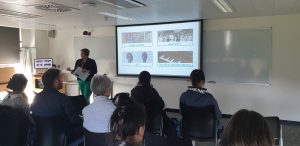
Dissertation Fair : #WeHaveGreatStuff – Rachel Hosker, Archives Manager and Deputy Head of Special Collections
It’s the final day of our very first Dissertation week at Edinburgh University Library. Here are some reflections and impressions of how it all went.
What we did
Our Dissertation week highlighted over 20 events delivered by the Library Academic Support Team, Research Data Management Team, Centre for Research Collections, Institute for Academic Development and Digital Skills team which could help students make the most of their dissertation experience. With some of these being delivered online, these events were able to reach a wide audience. A Dissertation Week guide https://edinburgh-uk.libguides.com/dissertation supported a timetabled social media campaign and will form a curated collection of the rich range of resources and support. We were able to incorporate student voices into these resources, with the School of LLC supplying a video clip on dissertation tips written by Francesca Triggs, a former LLC student, as well as including ‘Data Mindfulness’ videos by PhD student Candela Espeso Sanchez-Rodilla.
At the heart of Dissertation Week was a brand new Dissertation Fair event, which focused on exploring what library resources are available to support a research question, and managing the bibliographic and research data students find. The stalls at the fair featured not only our University teams but also digital resource suppliers, the National Library of Scotland and National Museums Scotland Libraries. Over 100 staff and student attended the Dissertation Fair and the programme of bookable presentation sessions which accompanied the Fair.
What staff thought
We were pleased that several Dissertation Course Convenors for Schools and Subject areas across the University were able to attend the event and delighted with their obvious enthusiasm. These academic staff spent time talking to Dissertation Fair stallholders and at the staff preview lunch. “Absolutely brilliant” was the comment from a paediatric surgeon who spent at least an hour there. One member of staff had moved his timetabled classes so that his students would be able to attend the Dissertation Fair. Others talked about how they wanted to integrate the event into their future programmes for dissertation students. One commented, “We’d like to be part of a discussion about how we can make as much of this as possible available to our online students”.
What students thought
We had 122 pre-registrations for the Dissertation Fair event which was encouraging, and on the day, students were engaged and enthusiastic. One commented that the most useful part of the event had been “Talking with all the stalls. Found out so many things and places to research I didn’t think about”. Lots of students had positive comments about the presentation sessions which gave in-depth introductions to digital resources.
What we thought
Planning this event, in close collaboration with the Centre for Research Collections and the Research Data Management team, generated a lot of energy and creativity in the Library Academic Support Team. This was rewarded by the successful turnout to events, but even more so by the depth of engagement that we had with visitors to the Dissertation Fair day. One colleague commented, “Of all the student & staff facing events I have been involved in over the years – and there have been many – I felt that we were making a very real impact yesterday.”
What we’ll do next
We received 67 feedback responses from the 171 attendees across all of the Dissertation Fair events on 14 November, and we’ll be taking time to look at these and learn from them. We’d like to run the Dissertation Week and Fair again, potentially in semester 2, 2020. Next time around we think we can make it bigger and better, and we’d like to have greater student involvement in planning and developing Dissertation Week. Watch this space.
If you would like to get in touch about Dissertation Week, please contact Christine Love-Rodgers Christine.Love-Rodgers@ed.ac.uk

 Why do you need to use a reference manager?
Why do you need to use a reference manager?